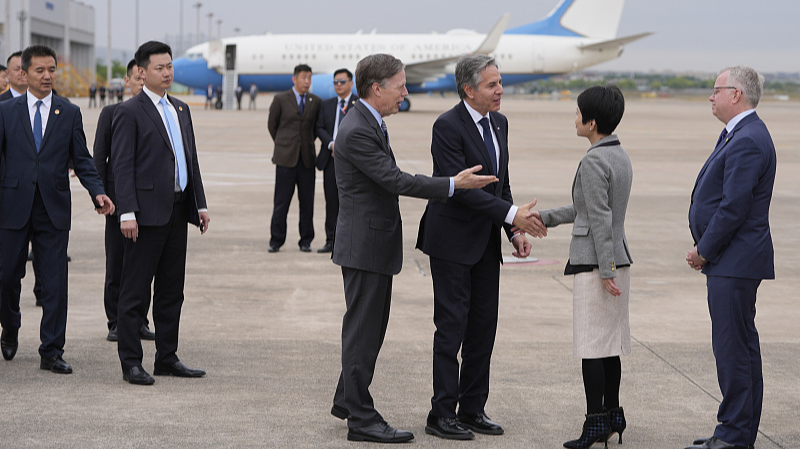 U.S. Secretary of State Antony Blinken prepares to depart from the Shanghai Hongqiao International Airport in Shanghai, China, April 25, 2024. /CFP
U.S. Secretary of State Antony Blinken prepares to depart from the Shanghai Hongqiao International Airport in Shanghai, China, April 25, 2024. /CFP
U.S. Secretary of State Antony Blinken prepares to depart from the Shanghai Hongqiao International Airport in Shanghai, China, April 25, 2024. /CFP
Editor’s note: William Jones, a special commentator on current affairs for CGTN, is the former Washington Bureau Chief for Executive Intelligence Review (EIR) News Service and a non-resident fellow of the Chongyang Institute for Financial Studies. The article reflects the author’s opinions and not necessarily the views of CGTN.
U.S. Secretary of State Antony Blinken’s visit to China on April 24 to 26 was an integral part of the new high-level diplomacy between the two countries, established at the Xi-Biden summit last November. The renewed visits give an opportunity for both sides to take stock of where the relationship is and to deal with any problems that have occurred in the interim period.
In this case, the issues that have arisen to affect the relationship, in particular, the more restrictive policies that the U.S. imposed on China recently in the area of trade, and particularly, high-tech trade, were far from resolved.
The mission of Blinken on this visit was to convince China to reduce its exports, on the pretext of so-called overcapacity, and to pressure China to reduce its trade with Russia in any area that could positively contribute to their military capabilities, in the U.S. view any area of high technology products.
Desperate over NATO’s failing efforts to stop the Russian advances on the ground, Washington feels that they may have enough leverage over China, because of their extensive trade relations, to force them to move away from Russia. In this respect, Blinken’s visit did not move that needle one centimeter.
This was made very clear to the Secretary by Chinese Foreign Minister Wang Yi, who did not mince his words in saying that negative factors in the relationship are still increasing and building. He again warned that China has red lines that shouldn’t be crossed and expressed his concern that the U.S. had taken measures that were not consistent with the agreements that had been made during the November summit.
In their four-hour meeting, Wang said that the U.S. was taking endless measures to suppress China’s economy, trade, science and technology. These measures, he underlined, “are not fair competition but containment, not de-risking but creating risks.”
In a meeting with Chinese President Xi Jinping, in a formal setting. Xi reiterated the principles on which the China-U.S. relationship must be based. In reply to the attempt to pressure China in its relationship with Russia, Xi made clear that both parties can have their own friends and partners, and do not target each other, do not oppose each other, and do not harm each other.
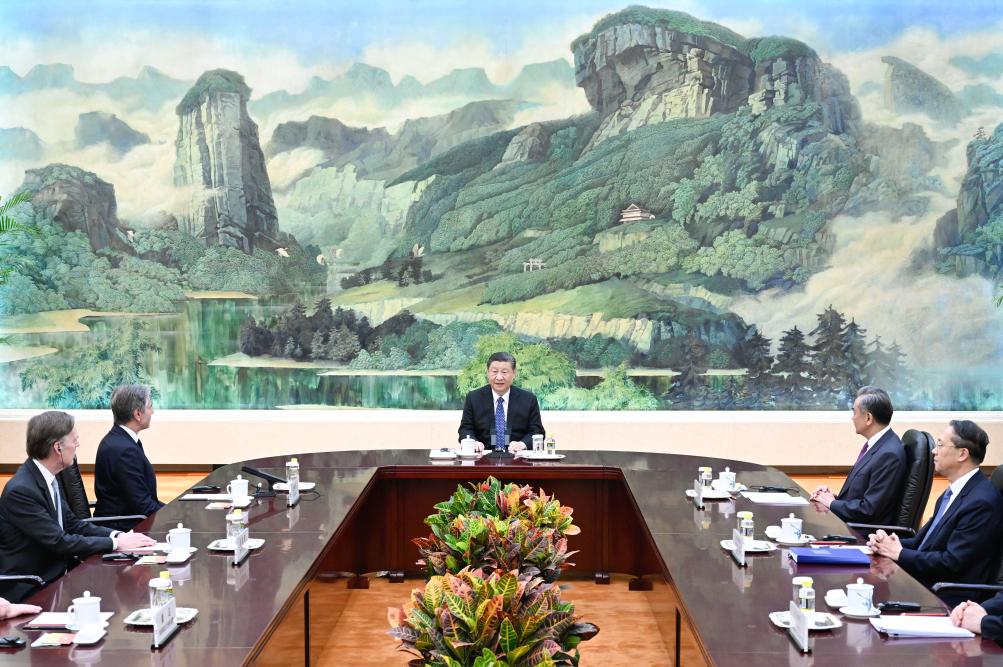 Chinese President Xi Jinping meets with U.S. Secretary of State Antony Blinken at the Great Hall of the People in Beijing, capital of China, April 26, 2024. /Xinhua
Chinese President Xi Jinping meets with U.S. Secretary of State Antony Blinken at the Great Hall of the People in Beijing, capital of China, April 26, 2024. /Xinhua
Chinese President Xi Jinping meets with U.S. Secretary of State Antony Blinken at the Great Hall of the People in Beijing, capital of China, April 26, 2024. /Xinhua
Xi stressed that the U.S. must begin to see China’s development in a positive light, calling this the “fundamental issue” that “must be put right, for the China-U.S. relationship to truly stabilize, improve and move forward.”
At a press conference after the meeting with Xi, Blinken reiterated all the shibboleths that he had expressed in his meetings, i.e. no decoupling, no support for “Taiwan independence,” and no new cold war, but at the same time made clear that if China does nothing to restrict its trade in high-tech with Russia, the U.S. and its “allies” were prepared to impose further sanctions.
While Blinken tried to assert a strong pose in saying this, he was somewhat more nervous in doing so. While there is probably a consensus within his own administration about this matter, it is far from clear how much the U.S. can persuade its “allies” to move further in the direction of imposing sanctions against China, and thereby penalizing their own economies on behalf of U.S. geopolitical concerns.
Blinken was even more adamant in an interview with the National Public Radio after the press conference. China “is the number one supplier of the critical components for Russia to rebuild its defense industrial base – machine tools, microelectronics, optics and other things.” This has to stop, he threatened.
If the U.S. pursues this line of thought, given the state of the world economy, it could come back to bite the U.S. in many different ways, including the more rapid push by Russia, China, and the countries of the Global South to create a financial architecture that is independent of the New York-London nexus, and thus free the financial system from arbitrary manipulation by the U.S.
The ball now, however, is in the court of Washington.
(If you want to contribute and have specific expertise, please contact us at [email protected]. Follow @thouse_opinions on Twitter to discover the latest commentaries in the CGTN Opinion Section.)
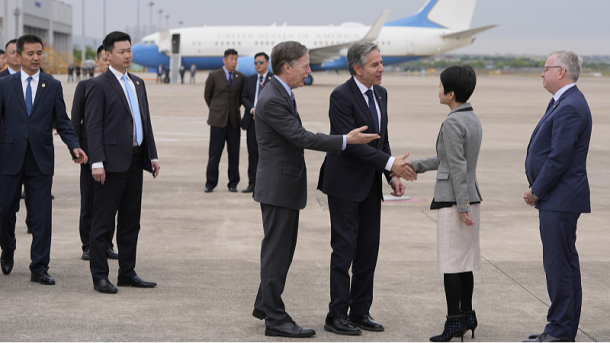
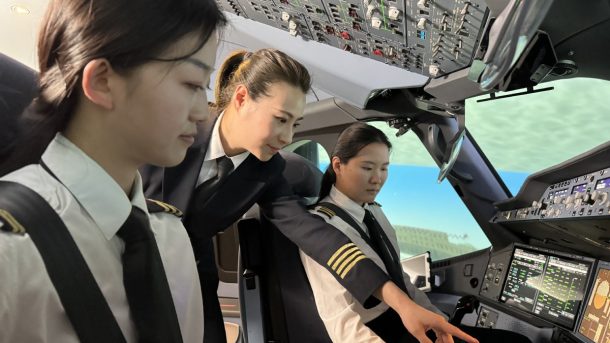
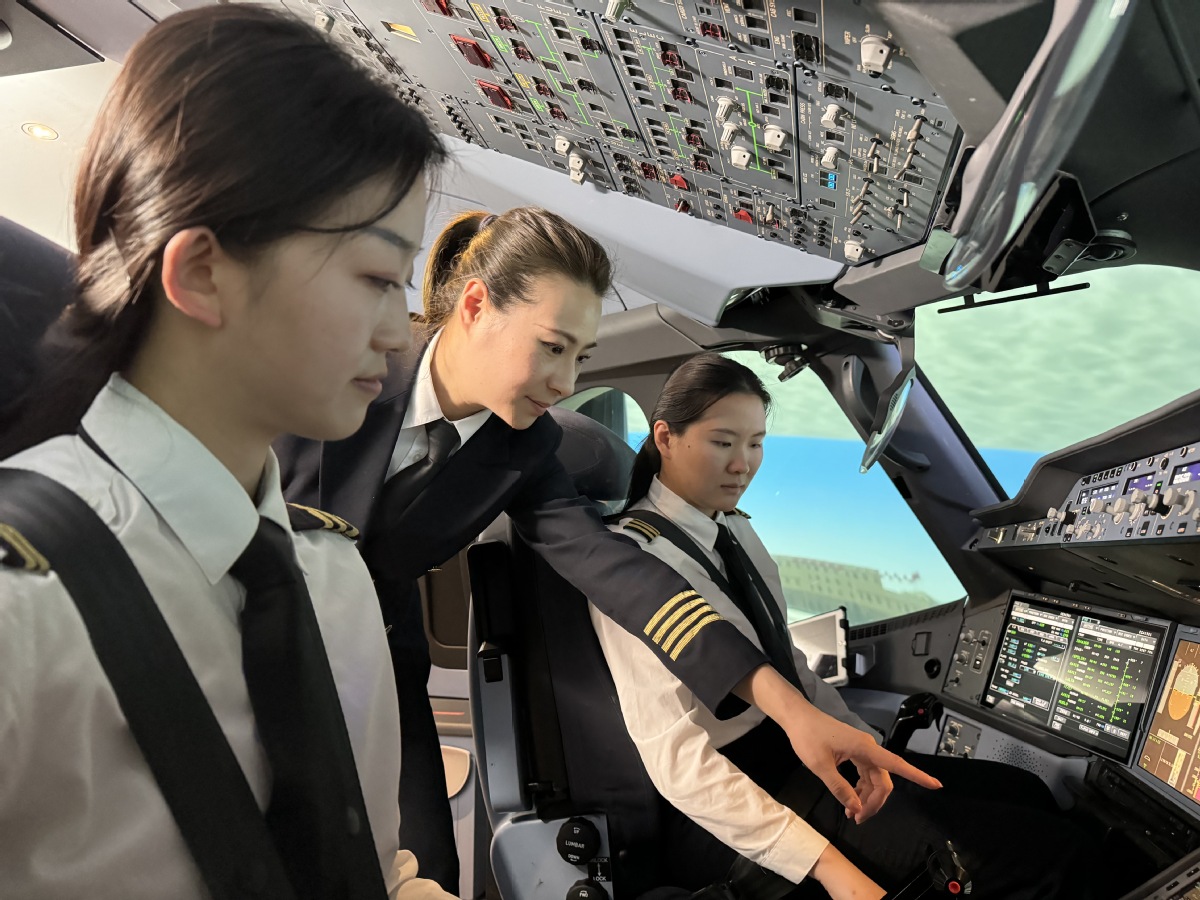 Huang He (center), a pilot at Air China, coaches trainees in a simulator. [Photo/China Daily]
Huang He (center), a pilot at Air China, coaches trainees in a simulator. [Photo/China Daily] 
 Tourists select intangible cultural heritage fans at a shop on the Dongguan Street in Yangzhou, Jiangsu province on April 29, 2024. [Photo/VCG]
Tourists select intangible cultural heritage fans at a shop on the Dongguan Street in Yangzhou, Jiangsu province on April 29, 2024. [Photo/VCG] 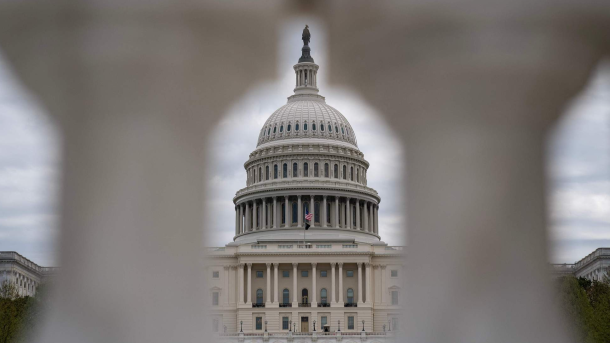
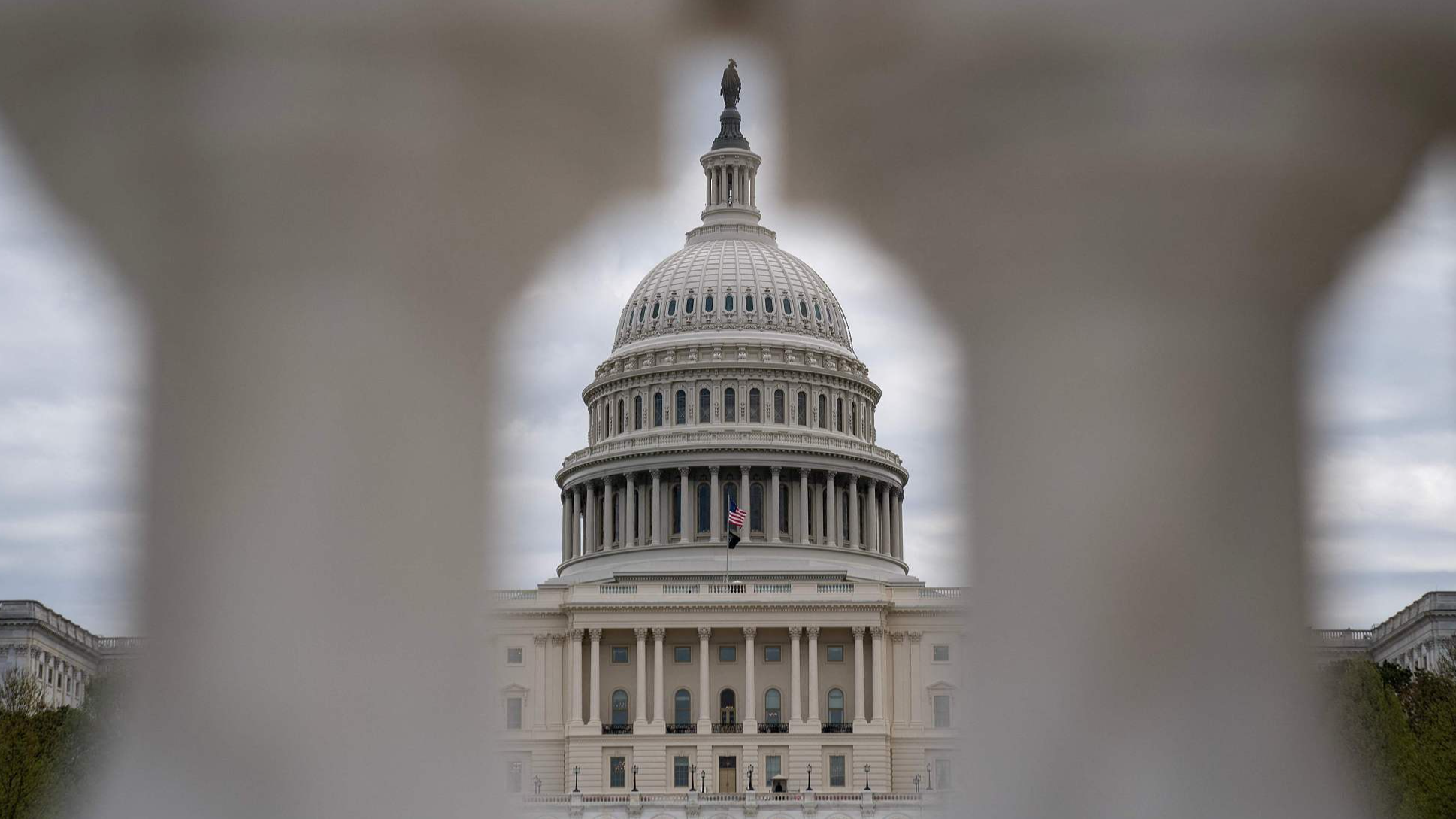 A view of the U.S. Capitol in Washington, D.C., April 20, 2024. /CFP
A view of the U.S. Capitol in Washington, D.C., April 20, 2024. /CFP 
 China’s Shenzhou-17 manned spacecraft separates from the Tiangong space station combination, April 30, 2024. /CMG
China’s Shenzhou-17 manned spacecraft separates from the Tiangong space station combination, April 30, 2024. /CMG 
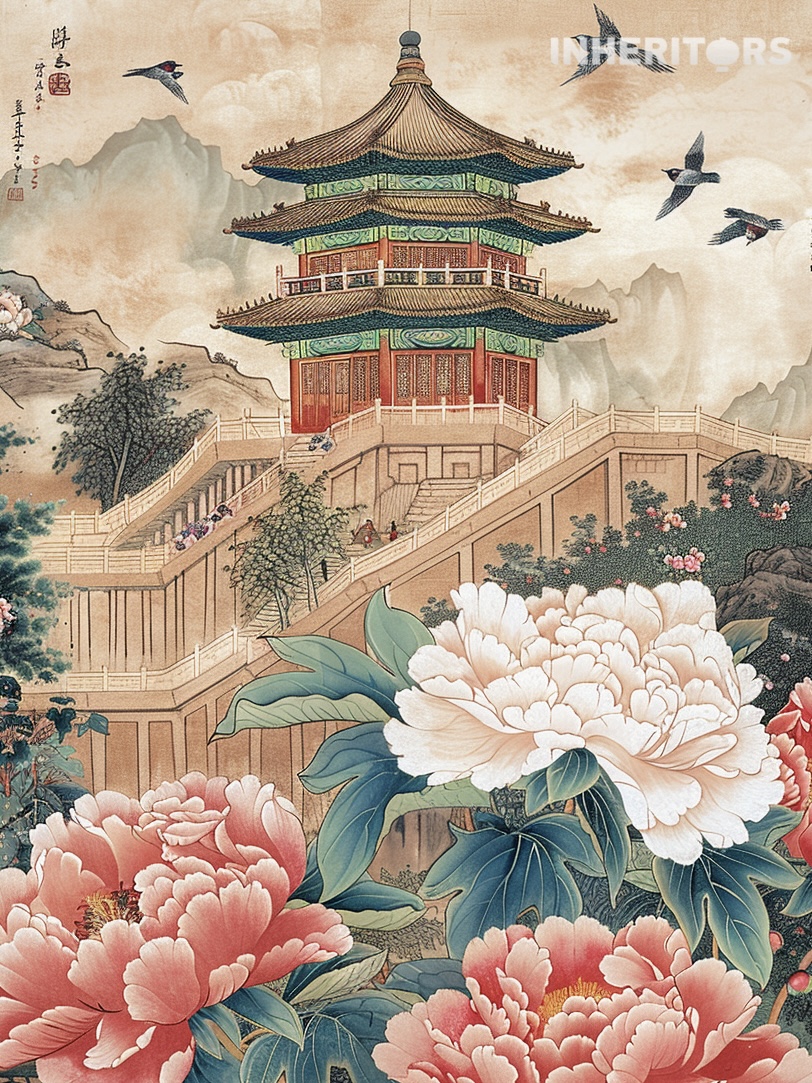 An AI-generated Chinese-style peony wallpaper /CGTN
An AI-generated Chinese-style peony wallpaper /CGTN  An AI-generated Chinese-style peony wallpaper /CGTN
An AI-generated Chinese-style peony wallpaper /CGTN  An AI-generated Chinese-style peony wallpaper /CGTN
An AI-generated Chinese-style peony wallpaper /CGTN  An AI-generated Chinese-style peony wallpaper /CGTN
An AI-generated Chinese-style peony wallpaper /CGTN  An AI-generated Chinese-style peony wallpaper /CGTN
An AI-generated Chinese-style peony wallpaper /CGTN 
 A woman shields herself from the sun on a hot summer day, Bengaluru, India, April 29, 2024. /CFP
A woman shields herself from the sun on a hot summer day, Bengaluru, India, April 29, 2024. /CFP 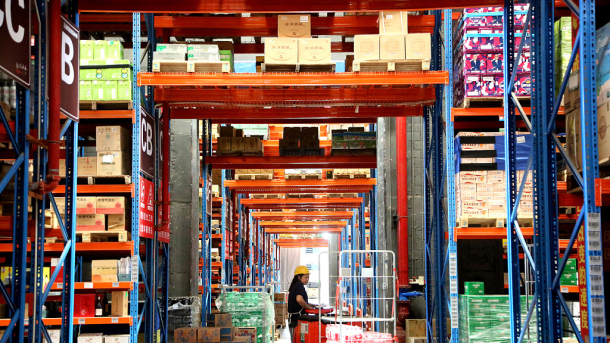
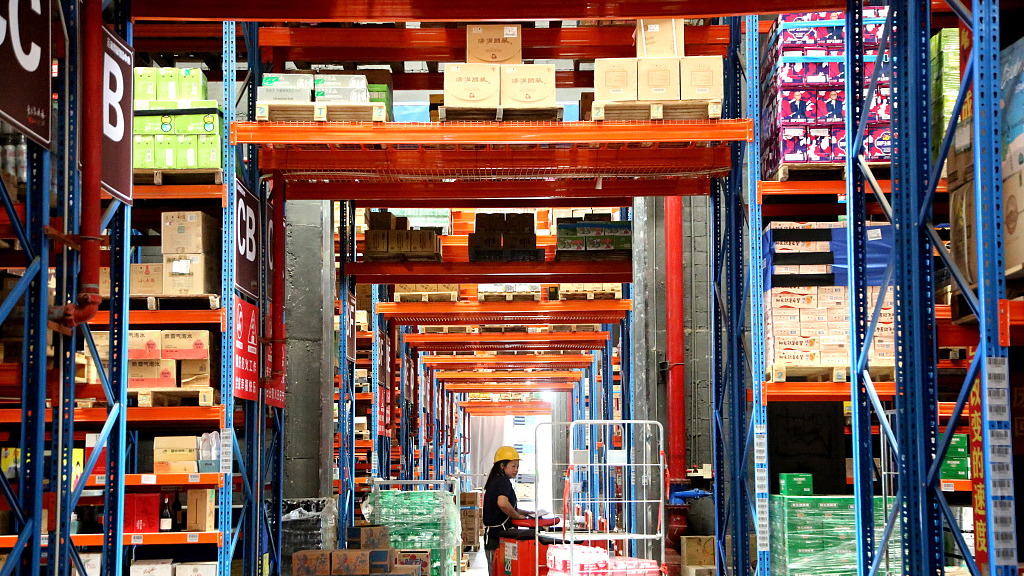 Staff member delivers goods according to orders at a warehouse in Lianyun District, Lianyungang City, east China’s Jiangsu Province. /CFP
Staff member delivers goods according to orders at a warehouse in Lianyun District, Lianyungang City, east China’s Jiangsu Province. /CFP 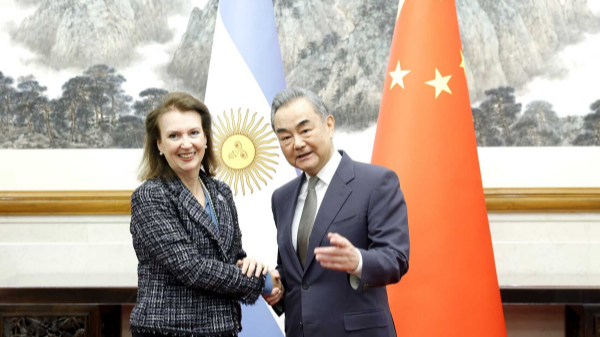
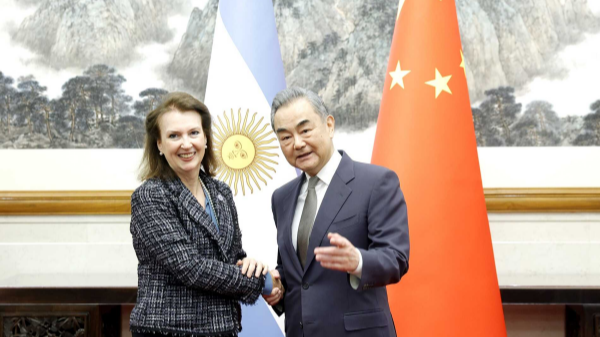 Chinese Foreign Minister Wang Yi (R), also a member of the Political Bureau of the Communist Party of China Central Committee, shakes hands with his Argentine counterpart, Diana Mondino, in Beijing, China, April 30, 2024. /Chinese Foreign Ministry
Chinese Foreign Minister Wang Yi (R), also a member of the Political Bureau of the Communist Party of China Central Committee, shakes hands with his Argentine counterpart, Diana Mondino, in Beijing, China, April 30, 2024. /Chinese Foreign Ministry